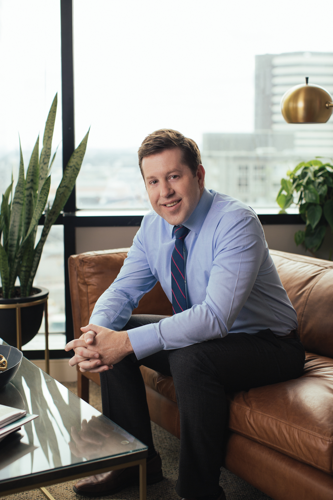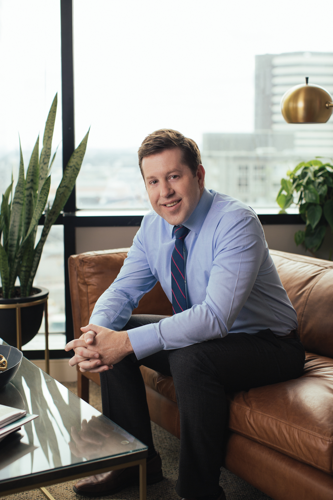
As a culture, we’re having a reckoning about sexual misconduct, and it’s because victims have come forward, despite the stigma, the reliving of their trauma and the potential for retaliation. Those include former and current Nashville musicians such as Austin Rick, who accused publicist Kirt Webster of assault; Katie Armiger, who is being sued by her former label Cold River after she spoke publicly about being counseled to endure harassment; and pop phenom Kesha, whose career was put on hold for years because her contract stipulated that she work with producer Dr. Luke, even after she filed a suit alleging that he assaulted her.
Another thread that connects these three individuals is a Nashvillian who’s working not only to seek justice for them, but also to eliminate the power dynamics that allow abuse to be so widespread: attorney Alex Little.
“The legal profession in Nashville has been focused on the labels, the managers, the star entertainers,” says Little, seated at a coffee table in a corner of his office. “And there’s not a lot of legal breathing room for folks who feel like they’ve been wronged by other people in the industry. I hope that we’re changing that, even by being seen publicly representing the little guy, or even the person who may not have a voice. We obviously don’t represent just little guys — we represent Kesha, who is a global superstar. But even in that scenario, the power imbalance between Kesha and Dr. Luke is off the charts.”
Little, whose father is a physician and whose mother founded the Discovery Center, a children’s museum and nature center in Murfreesboro, wanted to follow their example to make a positive difference, and he aimed first at global politics. Right after he graduated college in the late ’90s, he was part of the team that traveled with President Carter to Kenya to negotiate peace in Sudan. Later, he was a clerk at the International Criminal Court in The Hague, where the powerful work of trial lawyer Christine Chung inspired him to want to argue in court. In 2013, Little left a job as an assistant to U.S. attorney for the Middle District of Tennessee to join Bone McAllester Norton, where one of his first assignments was to join the team representing the victim in the Vanderbilt rape case.
“I’d say 80 percent of our work [is with victims of] sexual abuse and sexual harassment,” says Little. “Now that people are reporting it and being more vocal about it, the question is, ‘What can you do to actually effect some change for the individuals?’ ”
One of Little’s approaches is to draw attention to legal loopholes that fail to prevent or address misconduct. Commenting on the Armiger case in Rolling Stone Country, Little pointed out that Tennessee law doesn’t offer independent contractors (i.e., the legal status of most entertainers in relation to entities like record labels) the same protections it affords to employees. A bill addressing that issue has been introduced at the state legislature. The growing number of court cases that put abuse in the public eye helps create an environment where it is less likely to stay hidden, and Little has an eye on more circumstances where changes in the law can reduce opportunities for abuse.
There’s a parallel with another of his jobs, as the chair of a special joint committee established by the state House and Senate to investigate cold cases from the civil rights era. While in many cases the perpetrators of lynchings, arson and bombings are dead, it makes a difference when we publicly acknowledge these crimes and the fact that they weren’t fully investigated.
“We brought people to testify before this joint committee, and they told amazing stories on the record about some of these really horrible incidents,” Little says. “That really reinforced, for me, the same sorts of things that I saw in my other victims’ work … the importance of being heard. The importance of being able to speak your truth. I think what’s missing there, and I hope we’ll find some resolution, is the piece of responsibility. … What does responsibility look like in the context of historical crimes? I think, there, it’s more of a recognition that we as a state got something wrong.”






